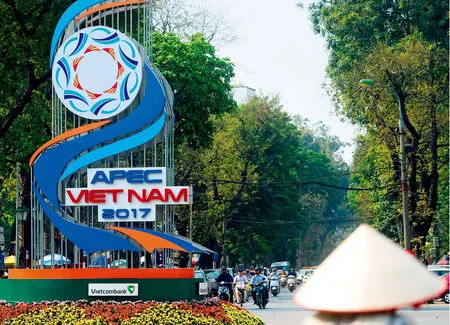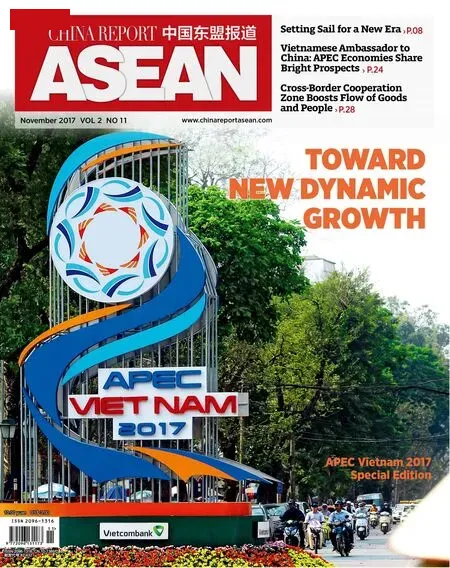APEC 2017:INCLUSIVE GROWTH,INNOVATION AND CLIMATE CHANGE
2017-11-22ByLiuChenyang
By Liu Chenyang
APEC 2017:INCLUSIVE GROWTH,INNOVATION AND CLIMATE CHANGE
By Liu Chenyang
Priorities focus on aiding a global economy stuck in a period of sluggish recovery
The global economy’s recovery remains sluggish in the aftermath of the global financial crisis. While the economic growth rate of the Asia-Pacific region is declining with each passing year, more and more Asia-Pacific Economic Cooperation(APEC) member economies see increasingly ineffective efforts at fiscal and monetary stimulus. In this context,creating new dynamism for economic growth with enhanced macro-economic policy coordination has become an urgent need for APEC economies to work together towards renewed regional cooperation.
To ensure continuity relating to the priorities of the APEC meetings of the past few years and highlight the interests of the host country, APEC Vietnam 2017 will focus on four priorities.These include promoting sustainable, innovative and inclusive growth,deepening regional economic integration, strengthening MSMEs’ competitiveness and innovation in the digital age,and enhancing food security and sustainable agriculture in response to climate change.
Promoting Growth
The priority of “promoting sustainable, innovative and inclusive growth” puts emphasis on innovation- and resource advantages-driven growth to ensure sustainable and equitable development of the Asia-Pacific countries and bring benefits to individuals from different sectors.
One of the key topics covered this year is the acceleration of structural reforms and innovation, which involves urging APEC members to submit their individual action plans for the implementation of the Renewed APEC Agenda for Structural Reform and enhancing experience sharing and capacity building cooperation. Strengthening competition policy coordination with objectives like improving the setting-up of institutions responsible for competition policy affairs in each member country is also a priority, as is promoting equal competition between stateowned and private enterprises,in addition to encouraging all forms of innovation, including technological innovation and innovation in product design,production, processing and marketing. The meeting will also focus on advancing the implementation of the Ease of Doing Business Action Plan(2016-2018) to further improve the Asia-Pacific business environment.
The topic also covers cooperation in other fields,including how to develop the services sector as an enabler of sustainable and inclusive growth, as well as how to enhance human resource development. For the services

A sign for the upcoming Asia-Pacific Economic Cooperation(APEC) summit in Hanoi.
Creating new dynamism for economic growth with enhanced macroeconomic policy coordination has become an urgent need for APEC economies to work together towards renewed regional cooperation.sector, emphasis is placed on further implementation of the APEC Services Cooperation Framework endorsed in 2015 and the Services Competitiveness Roadmap developed in 2016. For human resource development, the focus of this year’s discussion involves cross-border educational cooperation and training programs, mutually certified qualification systems and facilitating cross-border travel for academics, researchers and students.
Regional Economic Integration
Promoting regional economic integration has been one of APEC’s core objectives since its establishment, and the realization of the Free Trade Area of the Asia-Pacific(FTAAP) has been high on APEC’s agenda. In 2016, APEC members finalized a collective strategic study on issues related to the realization of the FTAAP,an important work related to the implementation of the Beijing Roadmap for APEC’s Contribution to the Realization of the FTAAP developed in 2014.On this basis, APEC members expect this year’s APEC summit to take new steps to advance the process and create favorable conditions for the eventual realization of the FTAAP.
Strengthening cooperation on global value chain and connectivity is another important measure designed to deepen Asia-Pacific regional economic integration. The APEC 2017 summit will focus on how to foster the APEC Strategic Blueprint for Promoting Global Value Chain Development and Cooperation and the APEC Connectivity Blueprint endorsed in 2014, and embark on the second phase (2017-2020) of the APEC Supply-Chain Connectivity Framework Action Plan.
In addition, APEC regards cross-border e-commerce as one of the most effective ways to promote regional economic integration. With the goal of achieving paperless trading in Asia-Pacific by 2020, a Crossborder E-commerce Facilitation Framework is expected to be drawn up in 2017.
Strengthening MSMEs’Competitiveness
As over 97 percent of enterprises in the Asia-Pacific region are micro, small or medium enterprises (MSMEs),their development is one of the top priorities of APEC.Since 2015, the topic of MSMEs has been at the core of APEC discussions.
MSMEs are key drivers of the Asia-Pacific market, but they are at a disadvantage in competition when compared to large companies. With the arrival of the digital age, many MSMEs are unable to afford the cost of using information technology or are short of employees capable of using the technology, making it more and more difficult for them to participate in global value chains and launch overseas operations. To deal with existing problems, this year’s APEC meetings will discuss ways to facilitate MSMEs’participation in global value chains, create a favorable business environment for MSMEs in the digital age and foster the development of startup businesses and innovationoriented MSMEs.
Enhancing Food Security
Food security is of great significance to realizing sustainable and inclusive development of the Asia-Pacific region. Meanwhile, agriculture is a pillar industry of Vietnam.Promoting APEC cooperation on food security is in line with the interests of Vietnam.
With regard to this priority,APEC further underscores the threat posed by climate change to food security in the region and encourages its member economics to take collective and unilateral actions focusing on sharing experiences in agricultural technology development and application. At the same time, APEC economies also discuss how to strengthen cross-border cooperation on sustainable management of natural resources, such as water resources, forest resources and marine resources. Furthermore,the economies pay close attention to fostering supply chain connectivity in the agricultural sector and the food processing industry, improving logistics infrastructure and retail services networks and promoting conformity of food safety standards.
4priorities
The APEC 2017 summit will focus onfour priorities.These include promoting sustainable,innovative and inclusive growth,deepening regional economic integration,strengthening MSMEs’competitiveness and innovation in the digital age,and enhancing food security and sustainable agriculture in response to climate change.
About the author:
Professor Liu Chenyang is a PhD supervisor and director of the APEC Study Center at Nankai University. He is also vice president of the China National Committee for Pacific Economic Cooperation Council and deputy secretary general of the Chinese Association of Asia-Pacific Studies.
